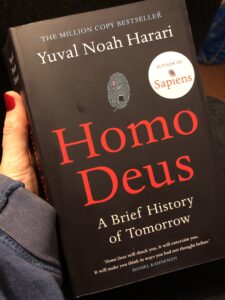“I encourage all of us, whatever our beliefs, to question the basic narratives of our world, to connect past developments with present concerns, and not to be afraid of controversial issues.”
 Thus Yuval Noah Harari starts Homo Deus, the book after Sapiens, followed by 21 lessons for the 21st century, a book I plan to read next year.
Thus Yuval Noah Harari starts Homo Deus, the book after Sapiens, followed by 21 lessons for the 21st century, a book I plan to read next year.
“The physicist Max Plank famously said that science advances one funeral at a time. He meant that only when one generation passes away do new theories have a chance to root out old ones. This is true not only of science.”
Homo Deus gave me some good tankespjärn I must admit. The historical retrospection into religion and science is thought-provoking and aha-generating at the same time, and the way Harari shines a light on the past, present and future make this a book well worth reading.
“Science is not just about predicting the future, though. Scholars in all fields often seek to broaden our horizons, thereby opening before us new and unknown futures. This is especially true of history. Though historians occasionally try their hand at prophecy (without notable success), the study of history aims above all to make us aware of possibilities we don’t normally consider. Historians study the past not in order to repeat it, but in order to be liberated from it.”
My copy of the book is filled with my notes in the margins, pertaining to many a different subject.
School. Religion in juxtaposition to science. Humanism. Artificial Intelligence.
Colonialism. Spirituality. Terrorism. Energy consumption.
“People are usually afraid of change because they fear the unknown. But the single greatest constant of history is that everything changes.”
Everything does change. And so I greatly enjoy reading books such as this one, that span the longer arcs of history and connects dots that I’ve not connected on my own. Helping me point out changes that I’ve not perceived.
“Fiction isn’t bad. It is vital. Without commonly accepted stories about things like money, states or corporations, no complex human society can function. […] But the stories are just tools. They should not become our goals or our yardsticks. When we forget that they are mere fiction, we lose touch with reality. Then we begin entire wars ‘to make a lot of money for the corporation’ or ‘to protect the national interests’. Corporations, money and nations exist only in our imagination. We invented them to serve us; why do we find ourselves sacrificing our lives in their service?”
Stories.
Personal stories. Communal stories. Cultural stories.
The stories I tell, the stories I listen to.
They all play a part in shaping me, making me into the person I am.
“Paradoxically, the more sacrifices we make for an imaginary story, the more tenaciously we hold on to it, because we desperately want to give meaning to these sacrifices and to the suffering we have caused.”
The greater my awareness is to their content and message, the more I am able to lead the life I want to.
I have a choice as to which stories I perpetuate, and so do you.
The book I am blogging about is part of the book-reading challenge I’ve set for myself during 2019, to read and blog about 12 Swedish and 12 English books, one every other week, books that I already own.
Tack för inspirerande tankar kring en bok som står på min att läsa lista.
Häromåret i Indien läste jag Sapiens högt för S – det blev upphov till många samtal. Kanske jag ska ta med denna till Sydafrikaresan?
Ingen dum idé alls – den ger definitivt mycket tankespjärn att samtala kring!